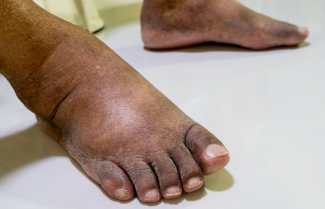Compression Therapy and Lymphedema: Frequently Asked Questions
September 26, 2019
Reflecting back on "In the Trenches With Lymphedema," WoundSource's June Practice Accelerator webinar, many people sent in questions. I have addressed some regarding compression use here.
Frequently Asked Questions on Lymphedema and Compression Therapy
Q)What is the best treatment choice for a patient with lymphedema, without an open wound, and an inability to circulate fluid?
A) As noted in the webinar, once other comorbidities contributing to the edema are ruled out, then a course of treatment can be set. If no arterial disease restricts the level of compression, then a plan of care agreed to by the patient can be set. Reduction of edema via all components of complex lymphatic therapy is preferred. The compression garment should be suited to the level of lymphedema of the client and be something that they can adhere to. Compression hosiery or an alternative garment, night-time device if needed, and perhaps a lymphedema pump are all choices. The International Lymphedema and Wound Training Institute (ILWTI) has developed an algorithm to selection called STRIDE (www.ILWTI.com).
In the Trenches with Lymphedema: Wound Care in Lymphedema Patients
Q) Should I use an Unna boot with calamine or zinc? With Coban?
A) The Unna boot was developed for use with venous disease and is frequently used in wound clinics. The moistness of the zinc or calamine really works on healing venous ulcers and getting rid of plaque buildup. The extra layering at the foot and ankle creates a slight gradient between them and the calf. Consistency in stretch and laying down the Coban wrap create an effective device for this low-level edema. I have added an additional short stretch layer if the patient with venous wounds is crossing into phlebolymphedema.
Q) Have you found utilizing a lymphedema pump beneficial in managing interstitial fluid and/or in preventing recurrent wounds?
A) I prefer to have my clients be more active in their reduction of edema and maintenance program. That being said, as clinicians, we need to gain adherence from our client to maintain their health, so if the pump will improve adherence, then I do it with a high-quality, multichambered unit with a section for trunk compression.
Q) Can pneumatic pumps increase inflammation and fibrosis?
A) Using a pump with multiple chambers that mimics the sequencing of manual lymphatic drainage (MLD) and includes the trunk component can reduce these risks. Chip pads to vary the texture of the compression can break up the fibrosis already present. Inflammation should be reduced by MLD as well as by a modern lymphatic pump.
Q) What kind of compression or edema management can I use in patients in my area who do not have a lymphedema clinician and who are often uninsured?
A) First of all, I would strongly encourage a facility in your area to get someone trained! Many areas are in this situation. Perhaps one facility or a few facilities could host a certification course in your area. These programs only grow once they are started. Wound clinics, vein clinics, or rehab departments and many others can all be great locations for a lymphedema therapist. As far as inexpensive compression goes, a short stretch wrap and a reduction kit are the least expensive during the edema reduction phase. If the definitive garment will be costly, short stretch wraps while saving for the garment, checking online for garment scholarships, GoFundMe, and getting proactive by starting a local foundation for this purpose have sadly been needed and done. The National Lymphedema Network has such a fund, and the Lymphedema Treatment Act, when passed, would provide a law that the garments be covered for those with insurance. Explore my blog on WoundSource.com for more answers to questions on In the Trenches With Lymphedema.
About the Author
Janet Wolfson is a wound care and lymphedema educator with ILWTI, and Lymphedema and Wound Care Coordinator at Health South of Ocala with over 30 years of field experience.
The views and opinions expressed in this blog are solely those of the author, and do not represent the views of WoundSource, HMP Global, its affiliates, or subsidiary companies.












